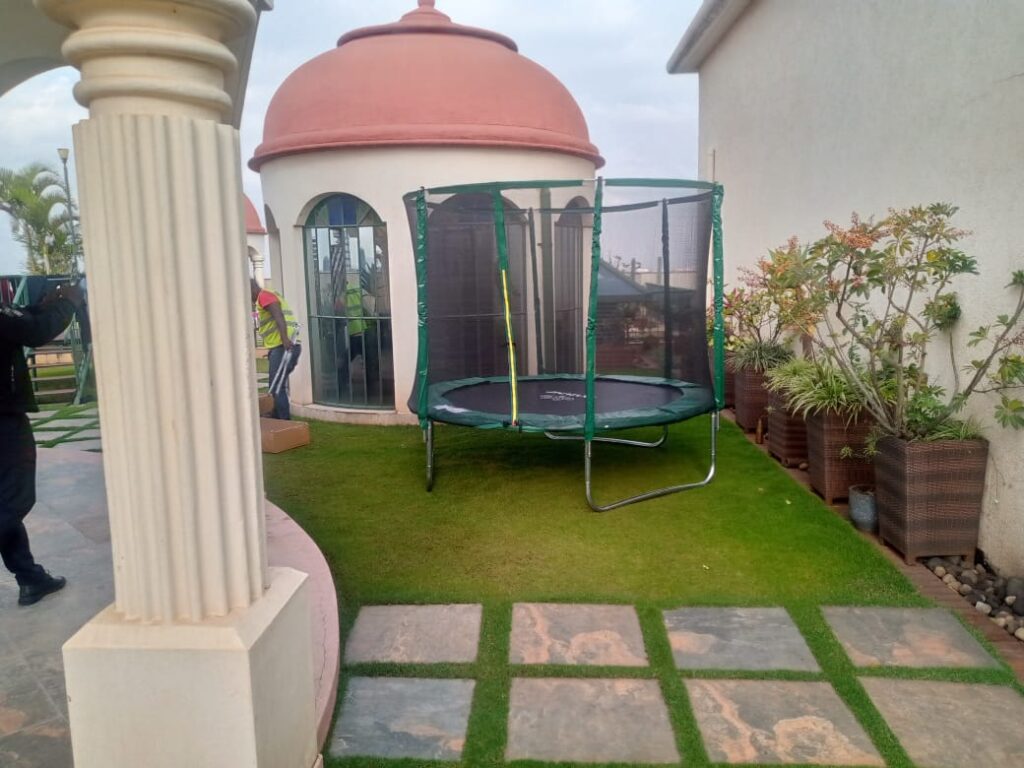Why Nairobi Kids Are Obsessed with Trampolines: A Look at Urban Childhood in 2025

In Nairobi’s increasingly vertical and security-conscious neighborhoods, a quiet revolution in childhood is taking place—one bounce at a time. Kids Trampolines in Nairobi are no longer just fancy backyard toys; they’ve become essential play and fitness tools redefining how children in the city grow, move, and socialize.
 Contact:
Contact:
Phone/WhatsApp: 0722 724 893
Visit: Golden Moon Star Building, Kilimani
Website: thriftyent.com | frugalinnovations.co.ke
As families navigate shrinking outdoor spaces, safety concerns, and tech-driven isolation, trampolines are bouncing into the spotlight as symbols of safe, energetic urban play.
A Shift in How Nairobi Children Play
The Nairobi of 2025 is not the Nairobi of a decade ago. Widespread urbanization, high-rise apartments, gated estates, and the rise of nuclear family living have transformed how and where children engage with their environment.
With fewer open fields and neighborhood playgrounds, many parents are turning to home-based solutions to keep kids active, social, and mentally stimulated. And what stands out most? The trampoline.
From estates in South B to gated homes in Syokimau, Kileleshwa, and Juja, trampolines are becoming a default fixture in the modern Kenyan household.
Safety First: Why Trampolines Feel Like a Win
For many Nairobi parents, the obsession isn’t just about fun—it’s about controlled safety.
With rising concerns over road safety, neighborhood insecurity, and unpredictable weather, outdoor adventures are less frequent. Instead of sending their children to roam in risky spaces, parents are investing in enclosed or in-ground trampolines that allow for supervised, contained play.
“I’d rather my kids bounce at home than wander outside,” says Mercy Wanjiru, a mother of three in Ruaka. “It’s active, fun, and I know they’re safe.”
This indoor-outdoor adaptability—placing a trampoline on a balcony, lawn, or rooftop—is helping trampolines gain traction in Nairobi’s tight and unpredictable urban setups.
A Screen-Free Alternative in a Digital Age
With tablets, mobile phones, and streaming content increasingly absorbing children’s attention, parents are desperate for ways to reduce screen time. Trampolines offer a physical and sensory-rich escape from the digital trap.
Jumping stimulates the vestibular system, builds muscle coordination, and even enhances focus. It’s no wonder that schools, occupational therapy centers, and even churches in Nairobi have begun incorporating trampolines into their youth programs.
Sizes, Styles, and Nairobi Trends
The most popular trampoline sizes in Nairobi in 2025 range from:
| Size (ft) | Best Use Case | Popular Locations |
|---|---|---|
| 6ft | Toddlers & small balconies | Ruaka, Kasarani |
| 10ft | Family backyards | Syokimau, Ruiru, Kitengela |
| 14-16ft | Schools, churches, event rentals | Lang’ata, Karen, Umoja |
Smart trampoline models are also gaining interest, especially from upper-middle-class families in areas like Lavington and Parklands. Features like solar-powered lights, AI jump counters, and motion-triggered alarms add both novelty and peace of mind.
Social Media, Status, and the Nairobi “Bounce Culture”
Platforms like TikTok and Instagram have helped push the trend even further. Nairobi kids film trampoline flips, dances, and challenges—feeding into a growing “bounce culture” online.
Owning a trampoline is not just a physical asset—it’s a social symbol. It reflects modern parenting, lifestyle adaptability, and a home that values movement and joy.
Trampoline Suppliers Leading the Charge in Kenya
Local suppliers like Thrifty Enterprises Nairobi and Frugal Innovations Kenya are responding to the surge by offering:
Budget-friendly models for estates and apartments
Custom in-ground installations for tight spaces
Rentals for birthdays, church events, and school fun days
Smart trampoline upgrades for tech-savvy homes
These businesses are making trampolines accessible beyond just Nairobi’s affluent suburbs, reaching areas like Donholm, Rongai, and Kangundo Road.
More Than a Toy
What was once seen as an imported luxury is now a practical, health-conscious, and lifestyle-driven solution. Kids Trampolines in Nairobi have become a defining feature of urban childhood—keeping kids active, engaged, and safe, one bounce at a time.
As Nairobi continues to urbanize and digitize, the humble trampoline is bouncing back—not just as a toy, but as a tool of modern parenting, physical wellness, and child development.
- Top 5 Affordable Home Fitness Trends in Kenya and How They Compare To Trampoline Fitness
- Trampoline Repair, Maintenance, and Replacement Parts in Nairobi, Kenya
- Where to Find Genuine Trampoline Spare Parts in Nairobi
- Trampoline Repairs in Nairobi, Kenya: FAQs, Costs, and Maintenance Tips
- Trampoline Repair Near Me in Kenya: Is Your Trampoline Worth Repairing or Replacing?

 Contact:
Contact:
